#moskva river
Video
youtube
Москва-река
#москва#москва-река#речной трамвай#трамвай#корабль#городскойпейзаж#moscow#moskva river#tram#bot#russia
5 notes
·
View notes
Text

Russia, Moscow, Krymsky bridge. September 2022
0 notes
Text
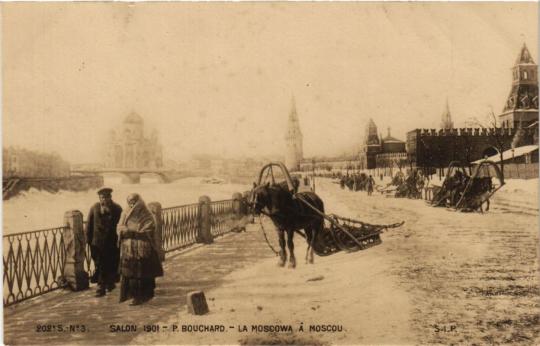
"The Moskva river in Moscow", painting by P. Bouchard
French vintage postcard
#vintage#photography#river#postkarte#french#carte postale#p#postal#bouchard#painting#briefkaart#postcard#old#moskva#photo#ansichtskarte#p. bouchard#sepia#moscow#postkaart#ephemera#tarjeta#historic
4 notes
·
View notes
Photo
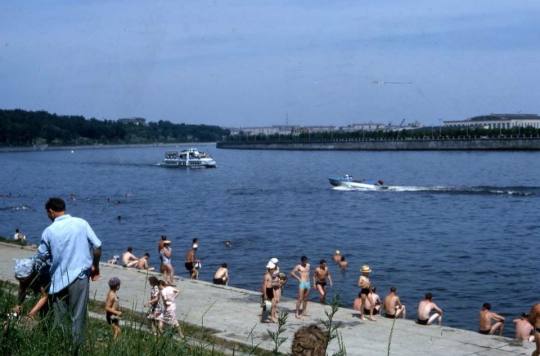
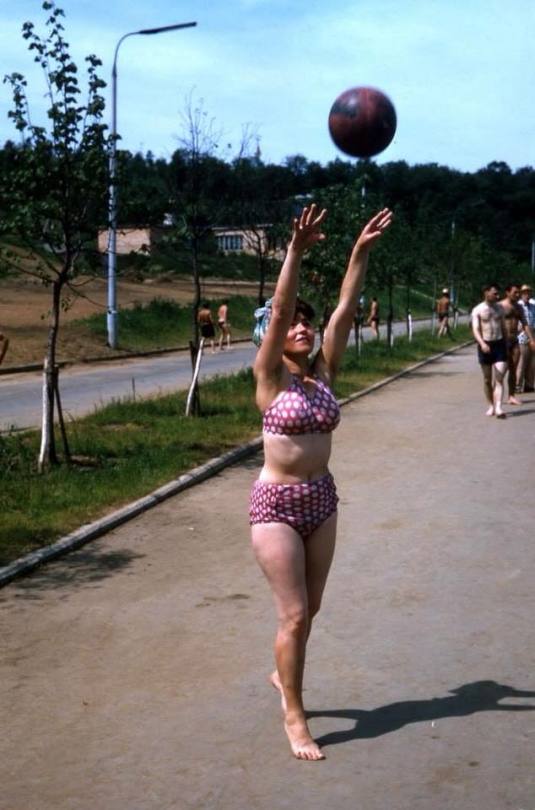

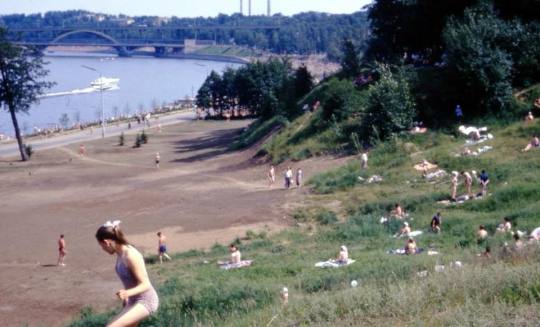
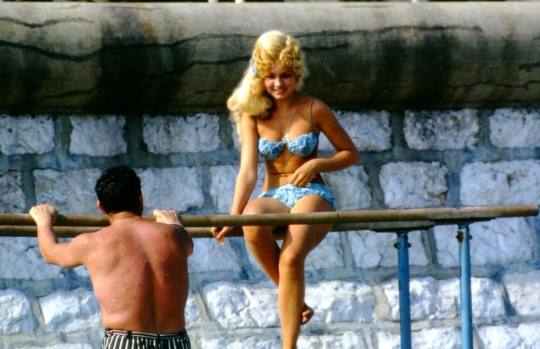

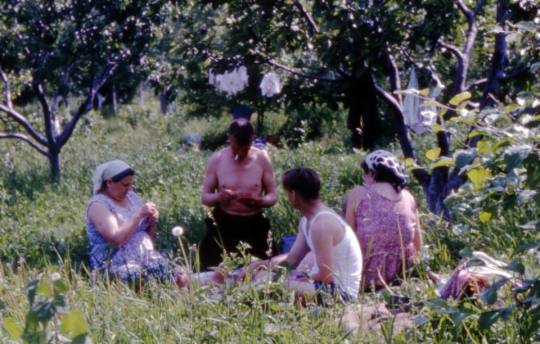

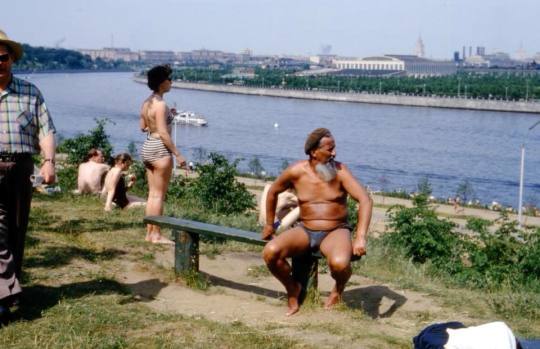
A summer day on Moskva-river (Moscow, 1964)
604 notes
·
View notes
Photo

“The uneven terrain with significant differences of high and low; a canal between the Moskva river and the Volga; small rivers, woods and villages; a nearby ancient town of Dmitrov, which is equal to Moscow in age; ships cruising the canal and trains outdistancing them – all this I saw from my window since my early years. It was a view that embraced all the diversity of the world.”We are in love with Andrey Remnev work: Paintings, as captivating as the description of his hometown Yakhroma, with connections to traditional techniques and surreal and expressive compositions, often with complex narratives and hidden stories. A joy for heart, mind and soul!
---
#beautifulbizarre #andreyremnev #painting #oiloncanvas
114 notes
·
View notes
Text

Art and intro by @thelxiope1. Thanks, pal! (,:
Last but not least! It is an honor to do the mini-view intro for our esteemed and gifted event organizer, the one, the only: @smarterinabsentia. You know her mostly as a writer of incredibly rich and detailed Sanvers fics filled with cinematic drama, action, passion, history, science, aliens, magic, music, and a vast knowledge of all things Super. She is also a talented artist and a superb beta reader. But today she shares her thoughts on writing and finishing one of her epic and ambitious works.
Tell us a little about yourself. How did you get started writing fic? Have you written for other fandoms? What are your favorite tropes?
Unless you count an Alien sequel as a kid, I really didn’t start writing fic until Sanvers. I’m a lifelong DC fan and read Maggie’s first appearance right off the stands, so I was excited to finally get a version of the character who wasn’t a name drop or a blip in an animated series. What I didn't expect was THAT chemistry and THAT coming out arc, and being able to witness the S shield become so indelibly associated with queerness it made my heart sing. So when Maggie walked out of Alex’s apartment for the last time, it was both a devastating loss of rep and the start of a careless and very painful dismantling of the world they’d built in Season 2. I’d been lurking on A03 and, as so many of these fic origin stories go, I thought, “I’ll just write one chapter. What could possibly go wrong?!"
For as much as I hate Alex’s S3 body snatching and the reasons for the breakup, I’m a sucker for the reluctant parent trope. I do like to put Maggie with kids, not as self-sacrificing mother figure, but someone who treats them very much the way she would an equal. This backfires on her sometimes, but counterintuitively makes her a better parent than Alex.
What were your inspirations for this particular story? What was it about this/these ships that grabbed you?
I’ve always been fascinated by the Soviet side of the Space Race and how they achieved so much on fewer resources--not to mention putting a woman in orbit two decades before the U.S. The U.S. had its glamorous flyboys, but the Soviets had women cosmonauts, not to mention soldiers and pilots and snipers, and something like 42 percent of doctors during World War II—a number that rose to 70% in the 1960s.
I’d just finished Svetlana Alexievich’s Unwomanly Face of War, an oral history of the women who'd fought on the Eastern front, and while I didn't expect to encounter any out lesbians in those interviews, the dearth of queerness felt pronounced. I started thinking about who Alex and Maggie might have been in that war, and soon enough, they were fleeing the Germans on a boat on the Moskva river. This is probably nothing new to folks writing historical AUs, but being new to fic at the time, it was eerie just how snugly those characters slotted into the tapestry of Soviet history, from Maggie’s navigating the power shifts in the NKVD/KGB to Alex strugging under the chokehold of Lysenkoism. Every character fit, and every character became this deep-dive learning experience about the era/s.
Has the time spent away from your story changed your outlook or approach to any of the storylines or themes? Have you had any new inspirations or breakthroughs/revelations in the meantime?
I’ve had some more insights into the characters, especially Jami, who surprised me, and there was a retcon I had to do with a reveal in the dialogue, something I realized was a big moment I should have saved for … the big moment (so I hope no one notices, haha!) And this is probably because I use world building as a means of procrastination, but I’m in this place right now where I’m as excited about the world I’ve set up at the end of the fic as I am about the fic itself.
Any advice for new or aspiring fic writers?
This goes back to something I wish I’d said at the Sanvers research panel a few years back. You might hesitate to write because you think you don't know enough about a particular subject, but that desire is often a signal that you know more than you’re giving yourself credit for. Once you get started, you'll discover you've gotten a lot right out of a mix of prior knowledge and spooky action at a distance. So absolutely do do the research and be respectful of the material, but don’t let a perceived lack of knowledge put you off from getting started. What turns out to be accurate in those first drafts will feel like magic, but what you have to correct in your seconds and thirds will stick and be the best kind of learning experience.
If you were going to promote this fic with a single line, what would it be?
Lesbians live and so does Laika.
Link to the story if you have one.
14 notes
·
View notes
Text
The Battle of Tarutino on 18 October 1812 by Peter von Hess
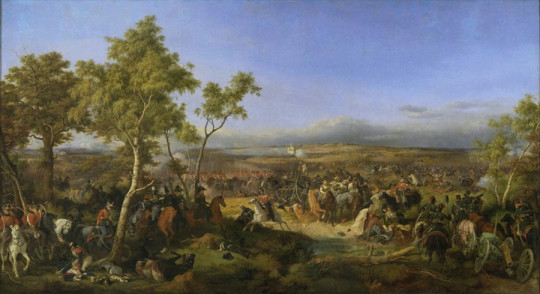
The Battle of Tarutino (Russian: Тарутинское сражение) was a part of Napoleon's invasion of Russia. In the battle, Russian troops under the general command of Bennigsen (as part of Kutuzov's army), on instructions from Kutuzov, launched an attack and defeated French troops under the command of Joachim Murat. The battle is sometimes called the Battle of Vinkovo (French: Bataille de Winkowo) or the Battle of the Chernishnya (Russian: Сражение у реки Чернишни) after the local river. Many historians claim that the latter name is more fitting because the village of Tarutino was 8 km from the described events.
After the battle of Borodino, Kutuzov realized that the Russian army would not survive one more large engagement and ordered his soldiers to retreat to the south of Moscow to reinforce his army. At first it retreated in the south-east direction along the Ryazan road. When the army reached the Moskva River it crossed it and turned to the west to the Old Kaluga road. The army pitched camp in a village of Tarutino near Kaluga. At the same time small units of Cossacks continued moving along the Ryazan road misleading French troops under the command of Murat. When he discovered his error he did not retreat but made camp not far from Tarutino in order to keep his eye on the Russian camp, while Napoleon occupied Moscow.
On 18 October 1812 Kutuzov ordered Bennigsen and Miloradovich to attack Murat's corps (20,000 men) with two columns stealthily crossing the forest in the dead of night. Bennigsen's main force included three columns led by Vasily Orlov-Denisov, Karl Gustav von Baggehufwudt and Alexander Osterman-Tolstoy respectively. The other column was supposed to play an auxiliary role. In the darkness most of the troops got lost. By the morning only Cossack troops under the command of General Vasily Orlov-Denisov reached the original destination, suddenly attacked the French troops and captured the French camp with transports and cannons. Since other Russian units came late the French were able to recover. When the Russians emerged from the forest they came under French fire and suffered casualties. Murat was forced to retreat to escape being surrounded, but the Russian general Baggehufwudt was killed, while Bennigsen was concussed in the leg. The French forces suffered more than 3,000 dead and wounded, 12 cannons, 20 caissons, 30 train-waggons had been taken, two generals killed, the Russians lost about 500 dead.
Kutuzov had attacked Napoleon's army and won a victory. One day later Napoleon started his own retreat from Moscow on the 19 October 1812 southwards in direction of Kaluga. The next major battle was the Battle of Maloyaroslavets.
The battle is depicted in Leo Tolstoy's War and Peace. In the novel, Tolstoy claims that while the battle did not achieve any of its goals, it was exactly what the Russian army needed at the time, in that it exposed the weakness of the French army and gave Napoleon the push needed to begin his retreat. Sources. The Battle of Tarutino, from Wikipedia, the free encyclopedia
youtube
#Отечественная война 1812 года#War of 1812#Художник#Начинающий художник#famous artists#Эрмитаж#Hermitage Museum#Russian Empire#Российская империя#История России#Наполеон#Napoleon Bonaparte#Наполеоновские войны#Михаил Кутузов#Mikhail Kutuzov#Peter von Hess#theintexp#Youtube
2 notes
·
View notes
Text

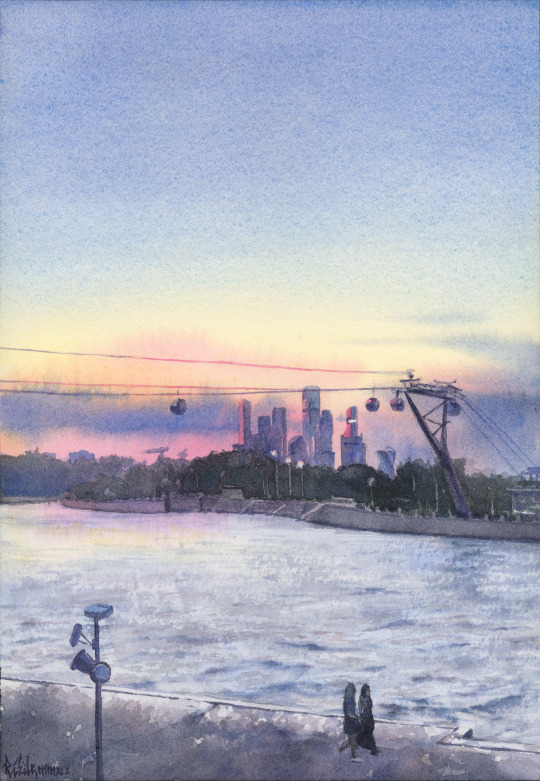
Moskva River 1 and 2
2019
One summer night from a previous life.
It was a sweltering June in 2019, and I came to Moscow for a university class reunion. As our job encourages nomadism, many came from abroad, and as it equally encourages eccentricity, many did not attend the party. So I met Dima Z. (с первого взгляда он некрасив, со второго — безобразен) another day, and we walked the usual route along the river, watching the setting sun and enjoying the heat subsiding, talking about the Russian pharma and what would the Spider-Man story be if he were an MSU student.
18x26 cm.
9 notes
·
View notes
Text
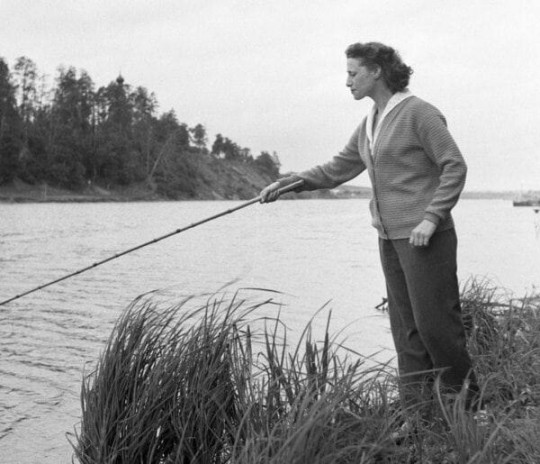
Fishing at the Moskva river. Maya Plisetskaya, 1956
17 notes
·
View notes
Text
♱ @vvranas.
It is sunset, and the hues of the Byzantine empire spill across the Kremlin palace: blood-orange, a rotted fig, a bruised apricot, the shades of hell and imperial purples melding into dusk. Helena’s gaze narrows into mere slits as she casts it across the Moskva river, the reflection of the Kremlin’s gleaming minarets beaming across otherwise somber darkness. Flat, motionless. Not even a wave dares crest against its shores. The princess’ koubikoularia have long retired to their cots, strewn across the princess’ sacred bedchamber as though they were children, travel-weary and spent. Helena, on the other hand, remains keenly alert; her skin raw from hours of bathing, scrubbing, and preening, moistened with vials of Greek oils so that it shimmers beneath the thin fabric of her tunic.

She turns to look at them, her ladies, a crease forming between her brows. They are deep in their slumber, even Irene, the sternest of the fearsome knot. There is ample opportunity to abscond, thinks she, as she clutches the gilded cross to her throat, fingering the pearls inlaid alongside its ancient jewels. To hell with it. The oath leaves her lips in a flurry as she garbs her glossy mane with a veil. It is a short trek from the princess’ exquisite apartments to Branas’ chamber, for the further into the palace’s mouth that she ventures, there are fewer sentinels to answer to, fewer eunuchs to distract with a purse of coins. There are lovers, sneaking along the halls in swirls of quiet laughter, and old maids, their eyes sealed with white films, and the occasional amanuensis, relaying letters between the Tsar’s guests. They pay the princess no mind, cloaked in an unassuming mantle of anonymity.
Helena lays a hand against the wooden plane of the general’s door, a hesitant intake of breath lodged in her throat. There are no voices within –– only the distinct crackle of a hearth. A heavy lock prevents her entrance. ‘General Branas, unless you are gamboling with another woman in there, I command you to unlock this door at once.’ Her voice wavers upon a plead, a rare instance of yearning; to see him and, with her own eyes, to ensure his well-being after weeks cleaved apart. When the door creaks ajar, her lips form into a pert grin. ‘Did you think I would not come?’
12 notes
·
View notes
Note
Hi! I’m sorry if this is a vague question, but you seem to be the most knowledgeable person to ask.
What, exactly, was the social calendar of the Imperial family like? What sort of engagements occupied their time, I mean. I’ve heard obscure references to court processions, blessing of the waters, even a swearing in for the Tsesarevich at 16, but I can’t find any real sources for these. If true, what were these ceremonies like? Any recommendations for books or articles that cover this topic are greatly appreciated!
Hey, that's very kind of you to say so!
It is a very broad question since throughout the year they attended all sort of ceremonies, including military reviews, balls, unveiling of monuments, religious holidays (Epiphany, Easter...), receptions of foreign dignitaries, and so on. Parades were organised on various occasion: military anniversaries to honour military victories, imperial birthday, visits from foreign delegations/monarchs, church parades... There were also the celebrations of the Orders which took place on the saint's day like the Order of St Alexander Nevsky, the Order of St Andrew the First-Called, the Order of Saint-Catherine....
As for the Blessing of the Waters, it was an annual ceremony held every Epiphany on January 6. A wooden pavillion was built for the occasion with, close to it, a hole cut into the ice. When the Emperor and the clergy arrived, the Metropolitan would blessed the Neva in dipping a cross three times in the river. In the past, it had been traditionally celebrated on the banks of the Moskva. After the religious ceremony, a banquet was served at the Winter Palace. For many years, it was one of the most important court ceremonies. If my memory is correct, Meriel Buchanan gave a description of this ceremony in her Recollections of Imperial russia.
The ceremony of the Tsar's oath was held when the heir of the throne reached his majority. The Tsesarevich swore an oath to the throne, promising to serve faithfully Tsar and country. I made a post few years ago, detailing this particular ceremony (x).
As for books recs I would recommend :
Scenarios of Power: Myth and Ceremony in Russian Monarchy. Volume One: From Peter the Great to the Death of Nicholas I and From Alexander II to the Abdication of Nicholas II by Richard S. Wortman. He made an abridged version: Scenarios of Power: Myth and Ceremony in Russian Monarchy: From Peter the Great to the Abdication of Nicholas II. (a serious and thorough scholarly book, truly a great read!)
At the Russian Court: Palace and Protocol in the 19th Century by Hermitage Amsterdam. (BEAUTIFUL book, you won’t be able to put it down)
The Winter Palace and the People: Staging and Consuming Russia's Monarchy, 1754–1917 by Susan McCaffray (has some interesting info!)
The Court of the Last Tsar: pomp, power, and pageantry in the reign of Nicholas II by Greg King. (i always been a bit wary of this author but it's one of the few book about this subject in English)
Then you have the account of the time: Muriel Buchanan Recollections of Imperial russia, A. A. Mossolov At The Court Of The Last Tsar, Alexander Grabbe The private world of the last Tsar and the like.
19 notes
·
View notes
Text
British defense officials have said that Russia is struggling to control the Black Sea, as explosions rocked the Crimean peninsula located along its shoreline in the latest blow to Moscow's forces in the region.
On Tuesday, blasts at an ammunition depot in the Dzhankoi district of Crimea, near the village of Mais'ke, damaged power lines, a power plant, and residential buildings in what Russia's defense ministry described as a result of "sabotage."
It came days after explosions at the Saki air base in the west of Crimea sparked an exodus of Russian vacationers from the region Moscow seized in 2014.
Six months into Russian President Vladimir Putin's full-scale invasion of Ukraine, Britain's Ministry of Defence (MOD) outlined in its daily update how Russian losses in the Black Sea that borders the peninsula had shown how tricky Moscow was finding it to maintain supremacy in the region it considers its backyard.
"The Black Sea Fleet continues to use long-range cruise missiles to support ground offensives but is currently struggling to exercise effective sea control," the defense officials said.
As well as "a significant portion of its naval aviation combat jets," the assessment referred to Russia's losses of its flagship Moskva, as well as control of Snake Island, the strategic and symbolic Black Sea location bitterly fought over since the start of the Ukraine war.
In April, Ukraine said that it struck the Moskva—worth an estimated $750 million—with two Neptune missiles that killed as many as 250 sailors. Moscow says the ship perished due to an onboard fire.
In June, Kyiv said its Harpoon missiles struck the Russian tugboat Spasatel Vasily Bekh that was transporting personnel, weapons and ammunition to Snake Island. Later that month, Ukraine said it had driven out Russian forces from the island, although Moscow said it had voluntarily withdrawn its forces.
The Black Sea Fleet's "currently limited effectiveness undermines Russia's overall invasion strategy," said the British defense ministry on Tuesday. This was partly because "the amphibious threat to Odesa has now been largely neutralized," referring to the Ukrainian port city.
"This means Ukraine can divert resources to press Russian ground forces elsewhere," it said, adding that Russia's vessels "continue to pursue an extremely defensive posture, with patrols generally limited to waters within sight of the Crimean coast."
Newsweek reached out to the Russian defense ministry for comment.
The strategic importance for Putin of the Black Sea was evident early on in the conflict when he moved to secure the Sea of Azov which links it with mainland Russia.
The Russian navy moved quickly to enact a blockade of the Ukrainian coast, which stranded food supplies until an agreement was reached last month, brokered by the U.N. and Turkey.
Salvatore Mercogliano, a maritime historian and associate professor of history at Campbell University in North Carolina, told Newsweek that while Putin has suffered losses, he had "still achieved many of his goals when it comes to the situation on the Black Sea."
He said that Russia's seizure of Mariupol and Berdyansk had opened up the Sea of Azov to Russian ships which were openly transiting the sea with their automatic identification systems (AIS) activated.
"This means that goods, grain and cargo from the interior of Russia—via the Don and Volga rivers, along with the Caspian Sea, is flowing," Mercogliano said, adding that the agreement to allow Ukraine to move grain from their ports in exchange for the Russians to flow their goods unimpeded, "is a success."
"While Europe, the U.S. and some countries have sanctioned goods out of Russia, the Russians have found alternative markets in Africa and Asia," he said. "The looming issue is whether ships are able to transit to Ukraine without incident. Any disruption, whether through an attack or a stray mine, could mean a disruption of trade out of the Black Sea, with obvious impacts on the global economy."
7 notes
·
View notes
Text
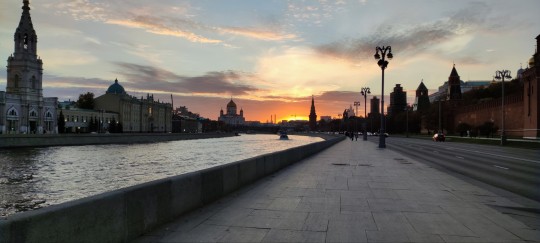
Russia. Moscow. Moskva river. Kremlin embankment. October 2022.
2 notes
·
View notes
Photo

Fisherman and cat at the bank of Moskva river (Moscow, 1987)
3K notes
·
View notes
Text

In the heart of Russia's storied capital, where the red bricks of the Kremlin have stood witness to centuries of history, a most peculiar event unfolded, altering the course of an ordinary day into the fabric of legend.
General Ivan Braginsky, the colossal guardian of Moscow, a figure as old as the folklore whispered in the chilly winds of Russian winters, awakened from his century-long slumber beneath the iconic St. Basil's Cathedral. As the hands of the Spasskaya Tower clock ticked with an ominous cadence, the ground rumbled and the air thickened with anticipation.
As the city’s denizens hustled along the cobblestone streets, a bizarre spectacle erupted. With a thunderous roar that echoed through the alleyways, General Braginsky emerged, towering above the city, his uniform adorned with medals of bygone eras. His presence was a relic, a mythic embodiment of the nation’s unyielding spirit.
But it was not a call to arms that had roused the General from his slumber; it was a far stranger duty that beckoned. From his gargantuan mouth poured not words of command, but an endless river of green slime, the likes of which the world had never seen. It oozed and flowed, filling the Moskva River with a viscous tide, engulfing the cobblestones, and trapping the city's peculiar, stout inhabitants in a sticky embrace.
These citizens, characters sprung from the pages of Russian fairy tales, found themselves in an uproar of confusion and delight. There were the Matryoshka men, their round bodies nesting within one another, scampering about with bewildered joy. The babushka ladies, their scarves fluttering like banners, chattered with excitement, while the street musicians, their balalaikas in hand, strummed a tune to the rhythm of this odd new world.
In the center of it all, a group of merchants, their samovars now bobbing like boats upon the green sea, adapted with the stoicism of a people used to the harsh whims of their land. They turned their impromptu vessels, hawking their tea and sweets to anyone who would partake.
Amidst the chaos, a little boy named Misha, with the courage of a storybook hero, navigated the slime with his makeshift raft, a door uprooted from his own home. He weaved through the laughing, singing, and occasionally grumbling figures, making his way to the General.
With a voice that belied his small stature, Misha called out, "General Braginsky, your wake-up has turned our day upside down! What can we do to restore Moscow to its former ways?"
The General, his face softening into a grandfatherly smile beneath his bushy moustache, replied, "Little one, Moscow has always been a city of wonder and surprise. Let this be a day of celebration, a day where the stories of old come to life and dance with the modern age. As the sun sets, so shall this green tide recede, leaving behind memories that will be told for generations."
And so it was, as the sun dipped below the horizon, casting a golden glow upon the city, the slime began to retreat. General Braginsky, with a final salute to the city he had watched over for centuries, sank back into the earth, leaving no trace but the stories that would be passed on.
The people of Moscow, their hearts full of laughter and eyes sparkling with the magic of the day, cleaned their beloved streets and monuments, knowing that life had granted them a story of their very own—a day when their city had been awash not just with history, but with the fantastical essence of fairy tales come to life.
0 notes
